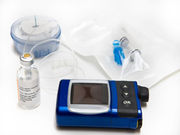Severe hypoglycemia, diabetic ketoacidosis less likely with insulin pump therapy than injection therapy
TUESDAY, Oct. 10, 2017 (HealthDay News) — For young patients with type 1 diabetes, insulin pump therapy is associated with lower risks of severe hypoglycemia and diabetic ketoacidosis and better glycemic control than insulin injection therapy, according to a study published online Oct. 10 in the Journal of the American Medical Association.
Beate Karges, M.D., from RWTH Aachen University in Germany, and colleagues conducted a population-based cohort study in 446 diabetes centers. They identified patients with type 1 diabetes who were younger than 20 years and had diabetes duration of more than one year.
The researchers found that 14,119 patients used pump therapy and 16,460 used insulin injections. A total of 9,814 patients using pump therapy were matched with 9,814 using injection therapy. Compared with injection therapy, pump therapy was correlated with lower rates of severe hypoglycemia (9.55 versus 13.97 per 100 patient-years) and diabetic ketoacidosis (3.64 versus 4.26 per 100 patient-years). Lower levels of glycated hemoglobin were seen with pump versus injection therapy (8.04 versus 8.22 percent). Compared with injection therapy, pump therapy was associated with lower total daily insulin doses (0.84 versus 0.98 U/kg). No significant difference in body mass index was seen between the treatment regimens.
“These findings provide evidence for improved clinical outcomes associated with insulin pump therapy compared with injection therapy in children, adolescents, and young adults with type 1 diabetes,” the authors write.
One author disclosed financial ties to the pharmaceutical and medical device industries and received a grant related to closed-loop systems from the European Commission.
Copyright © 2017 HealthDay. All rights reserved.








